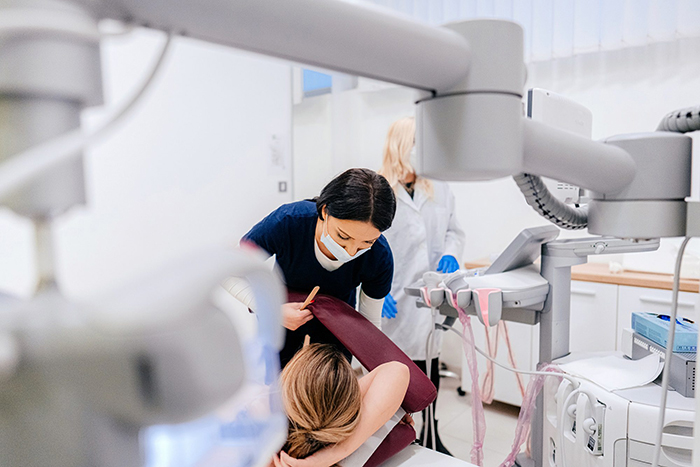Uterine cancer (also known as endometrial cancer) is the most common type of gynecologic cancer in the United States. It affects around 60,000 women annually. And the biggest risk factor is something we can control: our weight.
“Up to 60% of uterine cancers are linked to obesity,” says Susan Modesitt, MD, leader of the gynecologic oncology program at Winship Cancer Institute of Emory University. “And as the obesity rate in our country continues to grow each year, so too does the number of women who develop uterine cancer. Unlike other gynecologic cancers, which have been declining in recent years, uterine cancer rates continue to climb.”
Certain types of cancer, including uterine cancer, grow in response to the hormone estrogen. Obesity increases estrogen levels in the body. Higher estrogen levels, in turn, cause changes in the endometrium (the lining of the uterus) that can become cancerous.
“If you have a uterus, the number one thing you can do to lower your uterine cancer risk is to maintain a healthy weight,” Dr. Modesitt says.
Watch for Abnormal Vaginal Bleeding, Too
When uterine cancer is identified at an early stage, before it has a chance to spread, it’s easier to treat. One way to ensure an early diagnosis is to learn the signs of uterine cancer—and promptly report them to your doctor.
“Abnormal bleeding is a hallmark of uterine cancer at any age,” Dr. Modesitt explains. “For women who have already gone through menopause, even a tiny bit of spotting or bleeding should be evaluated. And for pre-menopausal women, abnormal bleeding can refer to extremely heavy periods, bleeding between periods or irregular periods.”
Just because you have abnormal bleeding doesn’t mean you have uterine cancer. But getting it checked out can offer peace of mind that you’re healthy—or lead to potentially lifesaving treatment.
Find Out Your Genetic Risk for Ovarian Cancer
Do you have a family history of certain cancers, including breast, ovarian or pancreatic cancer? If so, there’s a chance you’ve inherited an abnormal gene that increases your own risk of these cancers.
“Up to 25% of ovarian cancer cases are hereditary, meaning they’re caused by genetic changes that are passed down from one generation to the next,” Dr. Modesitt says. “For example, most women with hereditary ovarian cancer have an abnormality in genes called BRCA1 or BRCA2.”
Everyone has BRCA1 and BRCA2 genes. They’re supposed to repair cell damage and prevent you from developing certain cancers, including breast and ovarian cancer. If you’re born with an abnormality in one of these genes—also known as a gene mutation—the gene won’t work properly. So, anyone who inherits a BRCA1 or BRCA2 gene mutation has a higher risk of breast, ovarian and other cancers.
If you have a strong family history of ovarian cancer, it’s possible to find out if you carry one of these genetic changes. Just ask your doctor about genetic testing and counseling.
A licensed genetic counselor can help you understand your testing options, including the benefits and limitations of getting tested. They can help you move forward with testing—and can help you make medical decisions based on your results.
“Finding out you’re genetically predisposed to ovarian cancer won’t prevent you from getting it. But knowledge is power,” Dr. Modesitt says. “If we know you have a higher risk, there are steps we can take to minimize your risk or detect cancer as early as possible.”
For example, your doctor can prescribe medicines that lower the odds of cancer forming in the ovaries. They can order more frequent screening tests such as transvaginal ultrasounds. Also, there are blood tests that look for a certain protein associated with cancer.




